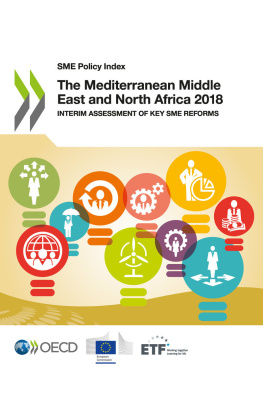DIRECTIONS IN DEVELOPMENT
Human Development
Striving for Better Jobs
The Challenge of Informality in the Middle East and North Africa
Roberta Gatti, Diego F. Angel-Urdinola, Joana Silva, and Andrs Bodor

2014 International Bank for Reconstruction and Development / The World Bank
1818 H Street NW, Washington DC 20433
Telephone: 202-473-1000; Internet: www.worldbank.org
Some rights reserved
1 2 3 4 17 16 15 14
This work is a product of the staff of The World Bank with external contributions. The findings, interpretations, and conclusions expressed in this work do not necessarily reflect the views of The World Bank, its Board of Executive Directors, or the governments they represent. The World Bank does not guarantee the accuracy of the data included in this work. The boundaries, colors, denominations, and other information shown on any map in this work do not imply any judgment on the part of The World Bank concerning the legal status of any territory or the endorsement or acceptance of such boundaries.
Nothing herein shall constitute or be considered to be a limitation upon or waiver of the privileges and immunities of The World Bank, all of which are specifically reserved.
Rights and Permissions

This work is available under the Creative Commons Attribution 3.0 IGO license (CC BY 3.0 IGO) http://creativecommons.org/licenses/by/3.0/igo. Under the Creative Commons Attribution license, you are free to copy, distribute, transmit, and adapt this work, including for commercial purposes, under the following conditions:
AttributionPlease cite the work as follows: Gatti, Roberta, Diego F. Angel-Urdinola, Joana Silva, and Andrs Bodor. 2014. Striving for Better Jobs: The Challenge of Informality in the Middle East and North Africa. Directions in Development. Washington, DC: World Bank. doi:10.1596/978-0-8213-9535-6. License: Creative Commons Attribution CC BY 3.0 IGO
TranslationsIf you create a translation of this work, please add the following disclaimer along with the attribution: This translation was not created by The World Bank and should not be considered an official World Bank translation. The World Bank shall not be liable for any content or error in this translation.
AdaptationsIf you create an adaptation of this work, please add the following disclaimer along with the attribution: This is an adaptation of an original work by The World Bank. Responsibility for the views and opinions expressed in the adaptation rests solely with the author or authors of the adaptation and are not endorsed by The World Bank.
Third-party contentThe World Bank does not necessarily own each component of the content contained within the work. The World Bank therefore does not warrant that the use of any third-party-owned individual component or part contained in the work will not infringe on the rights of those third parties. The risk of claims resulting from such infringement rests solely with you. If you wish to re-use a component of the work, it is your responsibility to determine whether permission is needed for that re-use and to obtain permission from the copyright owner. Examples of components can include, but are not limited to, tables, figures, or images.
All queries on rights and licenses should be addressed to the Publishing and Knowledge Division, The World Bank, 1818 H Street NW, Washington, DC 20433, USA; fax: 202-522-2625; e-mail: .
ISBN (paper): 978-0-8213-9535-6
ISBN (electronic): 978-0-8213-9536-3
DOI: 10.1596/978-0-8213-9535-6
Cover photo: Toufik Berramdane. Used with permission. Further permission required for reuse.
Cover design: Naylor Design
Library of Congress Cataloging-in-Publication Data
Striving for better jobs : the challenge of informality in the Middle East and North Africa /
Roberta Gatti... [et al.].
p. cm. (Directions in development)
Includes bibliographical references.
ISBN 978-0-8213-9535-6 (alk. paper) ISBN 978-0-8213-9536-3
1. Informal sector (Economics)Africa, North. 2. Informal sector (Economics)Middle East.
3. Labor marketAfrica, North. 4. Labor marketMiddle East. I. Gatti, Roberta.
II. World Bank.
HD2346.A56S77 2012
331dc23
2012011909
Contents
Preface |
Acknowledgments |
Contributors |
Abbreviations |
Overview |
Background |
Understanding Informality |
Informality in MENA: Levels and Trends |
Who Are Informal Workers? |
Informality among Firms |
Informality in MENA: Exclusion or Choice? |
Barriers to Coverage and Policy Options |
Notes |
References |
Chapter 1 | How Large Is Informality and Why Do We Care? |
What Is Informality? |
How to Measure Informality |
Why Does Informality Matter? |
Informality in MENA |
What Causes Informality? |
Conclusions |
Annex |
Notes |
References |
Chapter 2 | Profile and Micro-Determinants of Informality |
Introduction |
Macroeconomic Context |
Informality Profile |
Determinants of Informality |
Conclusions |
Annex |
Notes |
References |
Chapter 3 | Informality and the Firm |
Introduction |
Description of Informality among Firms |
Main Costs and Benefits of Informality for Firms |
Stylized Facts on Informality among Firms in MENA |
Conclusions |
Annex |
Notes |
References |
Chapter 4 | Informality: Choice or Exclusion? |
Introduction |
Informality and Wages |
Job (Im) Mobility |
What Are Informal Jobs Like? |
Self-Employment: A Choice? |
How Much Are Workers Willing to Contribute to Social Security? |
Networks and Intergenerational Persistence |
Conclusions |
Annex |
Notes |
References |
Chapter 5 | Barriers to Coverage and Policy Options |
Part 1. Addressing Institutional Barriers and the Low Productivity Trap |
Part 2. Extending Social Insurance Coverage |
|









